Hopelessly Devoted To Olivia
20sthanks to Kay

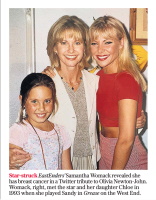
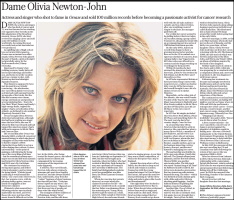
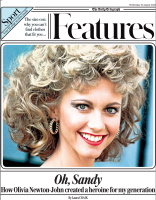
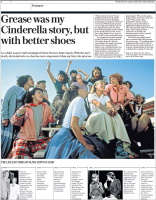
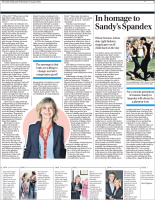
Olivia Newton-John, the British-born star of Grease, died yesterday, aged 73, after a long battle with breast cancer. The singer, who moved to Australia as a child, died peacefully
at her ranch in southern California surrounded by family and friends. She was best known for her 1978 role as Sandy in the film musical, when she starred opposite John Travolta, above.
OLIVIA NEWTON-JOHN, the actress and singer, who has died of cancer aged 73, was best known for her starring role opposite John Travolta in the film adaptation of the Broadway musical, Grease (1978); she later revived her singing career and sold some 100 million records worldwide, becoming the most successful solo artist Australia has ever produced. An uplifting tale of high-school love set in late 1950s America, Grease was an instant box-office smash. Newton-John played the part of Sandy, a prim schoolgirl led gratefully astray by the Brylcreemed rebel, Danny (Travolta).
Impressed by Danny’s hot-rodding prowess, Sandy kicks off her hooped skirtings and bobby-sox, and turns out at the vacation party as a vampy rocker, with frizzed-up hair and skintight Spandex trousers.
That Danny is supposed to have met his match is not wholly convincing – the wholesome, doe-eyed Olivia failed ever to look as if she had really sprung from the wrong side of the tracks. But the film had a sunny retro charm, energy and humour and produced several enduring hits – You’re the One That I Want, Danny and Sandy’s high-energy finale, topped the singles’ charts on both sides of the Atlantic, as did Sandy’s solo number Hopelessly Devoted to You.
Grease brought Newton-John international fame, although she had been working as a singer since the late 1960s and was 30 when the film was released. Up until its success, however, she had not gained much recognition in Britain (where she had been born), but had topped the American music charts, with such songs as Let Me Be There and Come on Over, for several years.
Her second film after Grease was Xanadu (1980), a rather ill-conceived musical fantasy in which she played a daughter of Zeus who wafts down to Earth to inspire a 1940s clarinetist (Gene Kelly) to set up a roller skating disco-niterie. It was a universal flop – to the point of gaining a cult following for being one of the worst films of all time – but the soundtrack album was a major success and title track Xanadu (performed by Newton-John and ELO) was a No 1 in Britain.
She continued to retain her strong mass appeal, and defied critical attempts to put her down for being bland. If white bread could sing it would sound like Olivia,
one cruel critic observed. In fact, her soprano voice, with its pleasing husky quiver, was not nearly so negligible as her detractors claimed.
Ultimately, what ensured her a following was her spectacularly marketable niceness and even those who were not fans of her music found it difficult not to like her. In the 1990s, after being treated for breast cancer, she talked openly about her illness and campaigned for increasing awareness of the importance of early diagnosis.
A willowy, blue-eyed blonde, Newton-John always retained a winsome girl-next door fragility about her. And she always insisted that, underneath, away from the vulgar
show business life, she was still just that. Criticism doesn’t upset me any more,
she told one interviewer. I figured out that there are lots of people out there who like white bread.
The youngest of three children of a Welshman, Brinley Bryn
Newton-John, and his wife Irene (née Born), Olivia Newton-John was born in Cambridge on September 26 1948, but she was brought up in Australia, where her father was a professor of German at the University of Melbourne. The family had distinguished academic roots: Olivia’s grandfather was Max Born, the Nobel Laureate German physicist.
When she was nine her parents divorced, an event which she claimed scarred her for life – the split was considered such a scandal that her father was dismissed from his university post. Young Olivia showed a gift for music as a child, and at 14, while a pupil at University High School, she and some friends started a singing group. A year later they won a talent competition. first prize was a trip to England. Against the stern advice of her father, she decided to drop out of school and remain in London. Teaming up with the young Australian singer Pat Carroll (later Pat Farrar), she spent the next few years performing in all the divey clubs and pubs in places like Leeds and Bournemouth
.
One night they were booked to sing at Raymond’s Revue Bar in Soho. When the girl who performed before them went on stage and swam nude in a fish tank, Newton-John realised that her flowery frock would not go down well with the all-male audience outside; and was relieved when, after one trembling round of Singin’ in the Rain, the manager paid them off.
For a while her career seemed to be stalling before it had ever really taken off, but after joining a group called Toomorrow, she gained a break with an accompanying part in a series of Cliff Richard television specials.
By the early 1970s, American record firms began to show a growing interest in her and she flew out to the US to embark on a rigorous schedule of concerts, from campus halls to Las Vegas hotels. While the British audience had seemed slow to discern her talent, the Americans were much more amenable. MCA Records soon offered her a contract and she began working on recordings for them in 1973. Within 18 months she had stormed the US charts with three hits, the country tunes If Not For You and Let Me Be There, and a pop song, I Honestly Love You.
Back in Britain in 1974 she made an appearance at the Eurovision Song Contest, representing Britain with Long Live Love, a rather saccharine ditty even for 1970s Eurovision – she herself thought it was a bit of a stinker. It lost out to Abba’s Waterloo.
Meanwhile, on the other side of the Atlantic, she was voted Female Vocalist of the Year by the Country Music Association in Nashville and Elvis Presley added Let Me Be There and her 1974 hit If You Love Me Let Me Know to his own concert repertoire.
In 1975 her hit singles included Have You Never Been Mellow, Please Mr Please and Something Better Do. The next year she had a number one country single Come On Over.
At around that time Newton-John decided to settle in America. She cancelled her plan to marry Bruce Welch, a member of the Shadows, and moved to Los Angeles, where she set up home with Lee Kramer, whom she had met on holiday in Monte Carlo. Kramer, equally smitten, gave up his business importing cowboy boots and devoted himself to managing her career.
The partnership was a fruitful one. In 1978 a new solo album, Totally Hot, did well. The Xanadu album went platinum, and her first solo album, Physical (1981), was another spectacular seller. The title track was voted Sexiest Song of All Time
by Billboard in 2010. Indeed, the lyrics were deemed so provocative that two American radio stations banned the song. The video – which was themed around a fantasy gym with a lithe and perky Olivia in shocking pink leggings – had the dubious honour of sparking the Eighties craze for headbands.
Another film, Two of a Kind, in which John Travolta also co-starred, was also a cinematic dud; but again, its score brought her a hit single, Twist of Fate.
In 1983, with her friend Pat Farrar, Olivia Newton-John opened a shop selling designer sportswear in Hollywood, called Koala Blue. This blossomed into a chain of some 60 shops around the world, before going bust in the early 1990s.
After her marriage, in 1984, to the actor Matt Lattanzi, whom she had met on the set of Xanadu, and the birth, two years later, of their daughter Chloe, Newton-John took time out from her career, returning with the LPs The Rumour (1988), the title track of which was written and produced by Elton John, and Warm and Tender (1989), an album of lullabies inspired by the birth of her daughter.
In 1992, while preparing for a comeback with a compilation album and a new tour to promote it, she was diagnosed with breast cancer. Following her treatment she became increasingly involved in health issues and set up the Gaia Retreat and Spa in Byron Bay, Australia. She also released an album, Gaia: One Woman’s Journey (1994), which reflected on her experience of the illness. She continued to record and tour well into her sixties. [Singing] is all I know, truthfully,
she said in 2016. Since I was 15, this is what I’ve done.
A keen conservationist – she once cancelled a concert tour of Japan to protest against the slaughter of dolphins caught in fishing nets – she was a Goodwill Ambassador to the United Nations Environment Programme. In 2008 she raised money to help build the Olivia Newton-John Cancer and Wellness Centre in Melbourne. In May 2017 she announced that she was cancelling her US and Canadian tour dates following the return of her cancer. After her divorce from Lattanzi in 1995, Olivia Newton-John had a relationship with a cameraman, Patrick Mcdermott, which ended in 2005 after he was reported missing and presumed drowned following a fishing trip off the Californian coast. In 2008 she married John Easterling, founder of the Amazon Herb Company. He survives her with her daughter from her first marriage.
Grease Was My Cinderella Story, but with better shoes
By Laura Craik
Tell me about it, stud.
To my childhood self, those five little words were the most thrilling, intoxicating, outrageous words I’d ever heard. When Sandy ground out her cigarette with the sole of her high-heeled red mule, then proceeded playfully to poke Danny in the chest with her, foot, it was the coolest thing I’d ever seen. In fact, it still is, several decades later.
To a generation of girls weaned on tales of Disney princesses but left cold by them, it’s hard to overestimate the impact of Grease when it was released in 1978. Sandy’s was a Cinderella story we could really get behind, because Sandy was her own heroine, an agent of her own destiny who didn’t wait passively for her prince to come along and save her with a glass slipper.
Who needs a glass slipper when you have a sexy red mule? Who needs a fairy godmother when you have Frenchy, and a cabal of loyal girlfriends willing to help you effect the greatest makeover of all time? And it is the greatest makeover of all time; the transformation scene to end all transformation scenes.
Olivia Newton-John herself once confessed that this was her favourite scene. Everything about making the film was fun, but if I had to pick a favourite moment; it was the transformation from what I call Sandy 1 to Sandy 2,” she told CNN in 2017.
When I put on that tight black outfit, I got a very different reaction from the guys on set.
And yet the role of Sandy very nearly didn’t go to her at all. At 29, Newton-John feared she was too old to play high-school student Sandy, and was worried that the film version of the hit musical would be a flop. It’s been suggested that Carrie fisher and Marie Osmond were mooted to play the part of Sandy, but most fans would agree with John Travolta that Newton-John was the perfect choice, with the voice and wide-eyed demeanour with which to capture her essence.
It was only after a two-pronged charm offensive by director Allan Carr and Travolta, already cast as Danny, that Newton-John acquiesced. I didn’t think there could be
any more correct person for Sandy in the universe,
Travolta later told Vanity Fair. I insisted that she be met and we cast her.
Two songs written by her long time music collaborator John Farrar — You’re The One That I Want and Hopelessly Devoted To You — were added to the film, with the soundtrack becoming a blockbuster that sold approximately 28 million copies worldwide, making it one of the bestselling albums of all time.
Certainly the music does much to enhance the feel good factor. Grease is designed to cheer up the rainiest day, full of uplifting songs that lend themselves particularly well to karaoke.
I was a shy, socially awkward child growing up in Edinburgh in the 1970s. Sandy Olsson was everything I wasn’t, and everything I wanted to be. Many were the hours whiled away caterwauling “Hopelessly devoted to yooooh” into a hairbrush, dressed in an approximation of Sandy’s long white nightie.
My mother took me and my two friends, Gillian and Corinne, to the cinema to watch Grease shortly after it was released. We sang You’re The One That I Want all the way home on the 31 bus. The rest of the day was devoted to role play, with costumes sourced from our parents’ wardrobes, and Gillian’s dressing—up box. As the plainest, quietest child of the triumvirate, I knew the drill: I would have to be Danny, while pretty blonde Corinne would get to be Sandy and pretty brunette Gillian would get to be Rizzo. Not until a friend’s fancy dress party some six months later did I get to assume the mantle of my heroine, even if my mother balked at me recreating Sandy 2 on account of my tender years and the difficulty of obtaining a pair of black Spandex trousers. No matter: Sandy 1 would do. Any, Sandy was better than having to be Danny.
In 1978, the character of Danny Zuko was as yet unblighted by allegations of sexist behaviour. In recent years, with much at justification, Grease has been seen in a very different light. Every time the film airs on TV, it attracts a barrage of criticism-on social media, most notably that its plot is misogynistic on umpteen counts. Certainly, the naysayers have a point. There is the scene when Danny forcefully kisses Sandy on the beach and responds to her Danny, don’t spoil it
with it’s not spoiling it, it’s only making it better
. Then, later, he makes a move on her at the drive-in, saying don’t worry about it — nobody’s watching
.
This has caused younger audiences to call for Grease to be cancelled. As a child, these insinuations sailed right over my head, but even as an adult, while I don’t condone Danny’s behaviour, I’d still argue for its right to be dramatised. The MeToo movement has rightly made men question their behaviour. Alas, it hasn’t always made them change it. As the mother of one tween and one teenage daughter, I can say with certainty that there are still Dannys everywhere.
While loving, consensual sex is the dream, to be young and horny is surely to experience some I degree of push-pull as two people explore the parameters of their desire.
The difference between Sandy and her modern counterparts, let’s hope, is that girls in 2022, are more confident in asserting their boundaries, and telling boys when to bog off.
Addressing criticism of the film during a podcast in 2021, Newton-John was measured. I think in this particular instance, it’s kind of silly because the movie was made in the 70s about the 5Os,
she said. It was a stage play, it’s a musical, it’s fun. Everyone’s taking everything so seriously. I think we need to relax a little bit and just enjoy things for what they are.
In some cases, what they are was never problematic in the first place. The modern Twitter take that Sandy changed her personality and identity for a man
misses the whole point of the transformation scene, a fact that I don’t think you need to be a diehard, middle—aged Grease fan to see. Apart from the fact that Danny equally changes his own identity by adopting a letterman cardigan, when Sandy sings goodbye to Sandra Dee, she’s changing for herself as much as for Danny.
She’s freeing herself from her good- girl image, itself an echo of the prevalent version of teen girlhood sold by Hollywood at the time. The message is that both are willing to change: and isn’t compromise what all good love story: flawed, as all love stories are, but more compelling than Cinderella, and with better shoes.
In Homage to Sandy's Spandex
Olivia Newton-John’s skin-tight fashion simply gave us all chills back in the day.
It would be many years after first watching Grease that I would finally own a pair of shiny black satin trousers like Sandy’s. Possibly, I am so old that my desire for them predates the invention of Spandex. More likely, they simply weren’t available in my home town — despite my home town being a capital city. And so I bided my time in trousers that, while far less exciting, were probably more appropriate for my age.
The pair Olivia Newton-John wore were vintage 50s, and to avoid breaking the zip she was sewn into them each morning on the set of Grease. How much did my friends and I love them? Let us count the ways. They were the opposite of our municipal school uniform, a shapeless thing in unflattering hues of maroon and grey. They were far more enticing than the prosaic blue Oddball Stretch jeans we wore on weekends. They were excitement in trouser form. Wearing those trousers, We agreed, meant that you couldn’t fail to have a good time. So enamoured of them was one friend, and so frustrated by their absence on the rails of Clockhouse, that she once tried to colour her legs black with a marker pen. I, on the other hand, tried to replicate their tightness by cutting the feet off a pair of black school tights, an action that got me no nearer to being Sandy — nor any nearer to being a financially independent woman, my mother swiftly docking 75p off my pocket money in her ire.
Much has been written about the cult of the skinny jean since Grease came out in 1978; Sandy’s black Spandex trousers are, arguably, the ultimate skinny jean, pre dating that particular cult by many years. But if the skinny jean is the preserve of the indie kid, the Spandex jean belongs firmly in the realm of disco, lighting up the dance floor like the skinny jean’s naughty big sister. They may not be in fashion now, but they’ll be back. You can bet your Pink Lady jacket that in the wake of Olivia Newton-John,’s sad death, a designer somewhere will be rewatching Grease and getting inspired to create a tribute.
I’d love to say that the allure of black Spandex diminished over time, but that would be a lie. These days, I revere it as much for its by slimming qualities as any other attributes, for Spandex was flattening stomachs and lifting bums when Skims and Spanx were still twinkles in their creators’ eyes. Even if they’ve been replaced in younger women’s affections by iterations in faux leather and high-shine PVC, for a certain generation of Women, Sandy in Spandex will always be a glamour icon, a woman whose destiny could involve nothing less than jetting off in a magical flying car.
The Life And Times of Olivia Newton-JohnBy Alex Diggins
1948: Born in Cambridge to Brinley Newton-John and Irene Born. Her farther worked on the Enigma Project at Bletchley Park. Her mother was the daughter of Max Born, a leading German-Jewish physicist.
1954: Moves with her family to Australia where he father secured a teaching position at the University of Melbourne
1957: Her parents divorce and the scandal causes her father to lose his professorship. Newton-John later claimed the divorce scarred her.
1963: Aged 15, she travels to England to pursue a singing career. Her debut single Till You Say You'll Be Mine flops. But she joins the pop group Toomorrow and begins to gain some recognition.
1971: Her career gains momentum wither her regular appearances on Cliff Richard's Variety show and she has a first breakout hit with a cover of Bob Dylan's If Not For You.
1973: Tours America to great success, and her country hits If Not For You and Let Me Be There win her respectively, a Grammy and female vocalist of the year at the 1974 Country Music Association awards.
1978: Her sales being to dip, but that changes when she's cast as Sandy in Grease. She is worried she is too old, at 29, to play the girl next door 17 year old. But it takes £326 million at the box office and makes her a millionaire.
1980: She releases Xanadu, a roller skating musical fantasy. The film is trashed by the critics but the soundtrack becomes a global hit.
1981: Her success continues with the sweat soaked raunch of the hit single Physical, which had been turned down by Rod Stewart and Tina Turner. In total Newton-John will sell more than 100 million records.
1992: She is diagnosed with breast cancer and cancels a planned comeback tour. She pivots into raising awareness of the disease and auctions off her outfits from Grease and Xanadu to raise funds.
2008: Marries John Easterling founder of the Amazon Herb Company. She was previously married to Matt Lattanzi but divorced in 1995. Afer that, she dated cameraman Patrick McDermott (lost at eas in 2005).
2022: Newton-John dies of breast cancer after the disease returns for a third time.